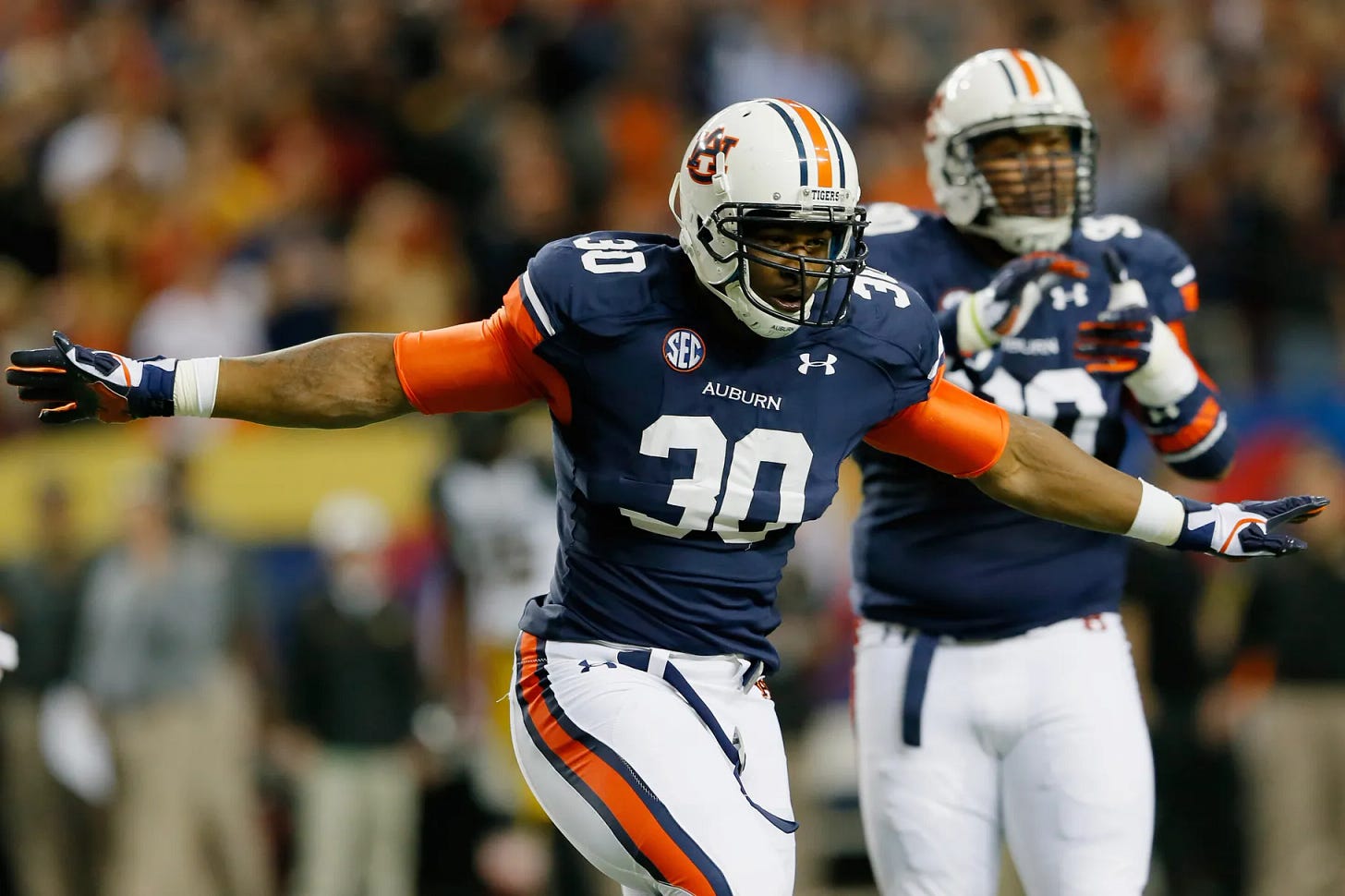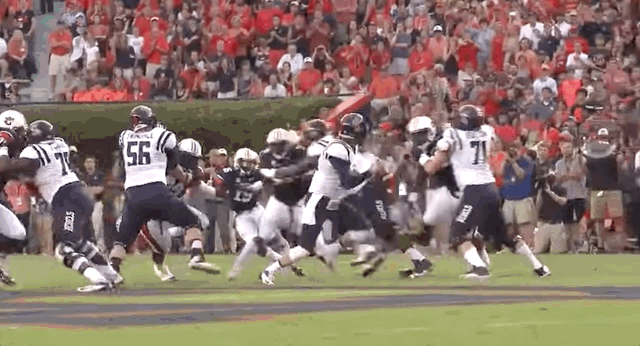The Ballad of Dee Ford
In just a couple of months during the 2013 season, an undersized piano player became one of the most feared pass-rushers in football.
When Auburn took the field against Ole Miss in Week 6 of the 2013 season, fresh off a season-shifting loss at LSU and a much-needed off week, no one could have expected what was coming next.
And, no, that’s not just a reference to the Miracle at Jordan-Hare to beat Georgia in November or the even more famous Kick Six to beat Alabama two weeks later.
It’s also not a reference to how Auburn’s retooled, run-heavy offense would kick into overdrive in the month of October, putting up an absurd 7.98 yards per play and 45.5 points per game.
It’s not even a reference to the chain reaction of events that would get Auburn to eventually play for a national championship against an unstoppable Florida State team.
No, it’s a reference to how Auburn’s 30-22 home win over Ole Miss on that Saturday night in Jordan-Hare Stadium would be the start to one of the best runs of form for any Auburn defensive player in the modern era.
There was little to suggest that Dee Ford would do what he was about to do.
That was pretty fitting for Ford, whose football career was all about overcoming the odds. He arrived at Auburn in 2009 — originally recruited by Tommy Tuberville, but eventually signing with Gene Chizik — as an unheralded addition to a class that would also produce the likes of Nick Fairley, Philip Lutzenkirchen, Emory Blake and Daren Bates.
Ford was a 3-star prospect from St. Clair County High School in Odenville, Ala. His Rivals page listed him at 6-foot-2 and just 190 pounds. But Ford was a pass rusher, recording 18 sacks and 38 tackles for loss as a senior. He had a dozen sacks as a junior, too. Ford was a playmaker, even though he was far from the prototypical size.
Clemson and Mississippi State offered him scholarships out of high school, along with in-state mid-major powerhouse Troy. Ford played with his hand in the dirt throughout his high school career, but he was quickly moved to linebacker in his freshman season.
Ford played sporadically as a true freshman in 2009 and mostly was on the sidelines during Auburn’s 2010 national championship season — one where plenty of his classmates were star players. He missed classes and meetings as a young player, and barely playing in that title run served as a “wake up call” for him.
Ford was set to put it all together as a defensive end in 2011, but an injury limited him to just three games. He missed time in all of his seasons on the Plains, including a dreadful 2012 season for the team as a whole — yet one where he established himself as a pass-rushing weapon with a team-high six sacks.
Under Gus Malzahn and his new staff in 2013, the hype around Ford was real in the preseason. Defensive coordinator Ellis Johnson practically named him a starter by the end of spring practices, and Ford was one of Auburn’s team representatives at SEC Media Days, where he impressed onlookers with his piano-playing prowess.
Ahead of the BCS National Championship Game, Ford revealed that he was also a singer, but he didn’t do it too much, because it “takes away from my aggressiveness.” But his football and his music sometimes went hand-in-hand.
“Whenever I would learn a song, I would always start slow to figure it out and then play it over and over and over again until it became second nature,” Ford said in 2014. “Same thing on the football field. There are certain drills where I just work on fundamentals — like explosion, for instance. I want to have the same strength all the time and be able to find it when I need it. And that doesn't come just from playing. It comes from a more solid core.”
Everything was pointing toward a big 2013 for Ford. Then he suffered a “freak” knee injury during a fall camp scrimmage.
While he wouldn’t need surgery, he would miss the first two games of the season. When Ford finally got back to action against Mississippi State in Week 3, it was clear he was going to need some time to knock the rust off.
Following the off week, Ford took the field on the opening drive. On a third-and-6 inside Auburn’s 40-yard line — a scoring opportunity for Ole Miss — Ford finally recorded the first sack of his 2013 season.
The sack was a perfect showcase of who Ford was as a pass-rusher. When Bo Wallace was flushed out of the pocket, Ford disengaged and made a beeline for the quarterback. While Ford missed his first opportunity to bring Wallace down, he didn’t miss with his second chance.
Ole Miss punted on the ensuing play, and Auburn marched down the field on the next possession to go up by an early touchdown.
Later in the game, during an early fourth-quarter possession, Ole Miss faced a third-and-19. It was a perfect opportunity for Ford, who routinely beat offensive tackles much larger than him with pure speed, to shrink Ole Miss’ chances to move the chains.
The Ole Miss right tackle barely had time to get his hands on Ford before he was forcing Wallace to step up in the pocket. Ford then came back to the inside, eyes laser-focused on Wallace the whole time, to come up with another sack.
Those were the first two sacks of what would be a campaign with 10.5 of them for Ford, putting him in the highest tier of pass-rushing seasons in Auburn football history.
Keep reading with a 7-day free trial
Subscribe to The Auburn Observer to keep reading this post and get 7 days of free access to the full post archives.




